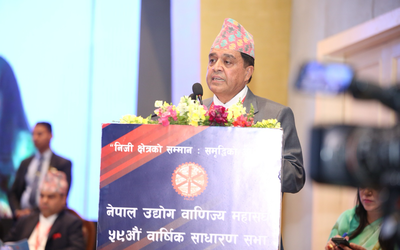
Despite Nepal's growing political instability and uncertain economic policies, its Balance of Payments favorable for over the last few years. Although Nepal's earning from export is inadequate to meet even importing the products for a couple of months, the growing remittances have paid for Nepal's import.
However, the situation has changed suddenly. If the present report of Nepal's Central Bank is any indication, Nepal's BoP is going to worsen in the coming days, given the trend of declining remittances. According to NRB, the first two months of the current fiscal year recorded a deficit of Rs 10.5 billion.
The Current Macroeconomic Situation of Nepal report released by Nepal Rastra Bank (NRB) revealed that BoP logged a heavy deficit as the current account registered a deficit of Rs 9.98 billion in the review period.
In the recent years, Nepal's import has drastically increased, particularly because of petroleum products. Similarly, Nepal even imported agricultural products, including rice, potato and livestock.
During the same period of last fiscal year, Nepal's BoP was in surplus. BoP had recorded a surplus of Rs 33 billion in the corresponding period of last fiscal year against the backdrop of current account surplus of Rs 18.35 billion.
“BoP indicates the overall economy of the country. BoP deficit means something is wrong,” said former NRB Governor Deependra Bahadur Kshetry. “I am a bit concerned about the present scenario as there is no reason to see any drop in remittances as the dollar has not depreciated nor the flow of migrant workers has come down."
There are two reasons for the decline in the remittances flow. According to experts, either the remittances are funneled through informal channels or the workers temporarily stopped sending money home due to weak dollars.
As Nepal's BoP surplus was based on flows of remittances, one can predict that it can collapse anytime depending upon the labor market. Experts hold the view that it can be achieved in a sustainable manner by increasing industrial productions and expanding service sector.
The NRB report showed that remittances decreased by 1.1 percent to US$ 871 million in the review period, compared to an increase by 19.6 percent in the same period of the previous year.
Although Asian Development Bank's economic report predicted a year back the possible BoP scenario, it went unheard.
Nepal's trade deficit continued to widen in the first two months of current fiscal year 2014/15 amid steep rise in imports and sluggish exports. Trade deficit jumped by 25.2 percent to reach Rs 111.93 billion as at mid-September. Trade deficit had increased by 16.6 percent in the same period of last year.
A worsening scenario is in relation to Nepal's trade with India. Nepal faced a huge trade deficit of Rs 73.34 billion with India in the review period. Similarly, Nepal's trade deficit stood at Rs 14.34 billion and Rs 24.25 billion with China and ´other countries´, respectively. However, Nepal´s trade deficit with India, China and ´other countries´ stood at Rs 59.48 billion, Rs 10.16 billion and Rs 19.74 billion, respectively, in the corresponding period of 2013/14.
According to the report, rise in trade deficit was due to decline in export to import ratio. Export to import ratio declined to 11.4 percent in the review period. Such ration was at 14.5 percent in the same period of 2013/14.
Similarly, the gross foreign exchange reserves decreased by a marginal 0.7 percent to Rs 660.8 billion in mid-September from Rs. 665.41 billion recorded in mid-July 2014. Such reserves had increased by 9.6 percent to Rs 584.61 billion in the same period of last year.
In this period, total export had come down to 14.43 billion with a decline of 4.8 percent. The annual inflation in the period is 7.6 percent, which, in the same period in previous fiscal year was 8.0 percent.
If Nepal continues to face the BoP slide at the present rate, it is likely to affect the overall economy. As there is the(no???) possibility of drastically improving Nepal's merchandise export and other products, including food and vegetables, and reduce the bill for Petroleum products, Nepal's economy will likely to face severe pressure.
As Nepal's political process is heading towards a more unstable and conflict-prone mode, it is likely to have greater impacts in the economic sector as well. As NRB has already indicated the scenario, the time has come for the Ministry of Finance to take certain drastic measures.
- NEPAL-THAILAND: Joint Business Council
- Apr 13, 2025
- BIMSTEC SUMMIT: Nepal’s Stand
- Apr 11, 2025
- IME GROUP: Expands Into Paper Industry
- Mar 24, 2025
- CPN UML: Instigated By India
- Mar 23, 2025
- ADB’S CHIEF ECONOMIST: Nepal Reduces Poverty
- Mar 11, 2025















